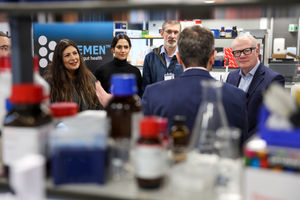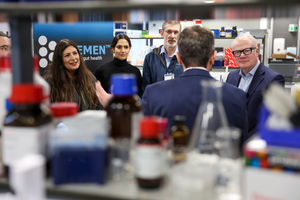Health Tech Innovations on Display
The West Midlands region is witnessing significant advancements in health technology, with innovative companies showcasing their latest developments to key regional political figures. The showcase included an AI-powered sensor designed to be used post-surgery, aiming to reduce hospital stays and improve patient recovery times.
Regional Support for Health Tech Innovation
The visit from Richard Parker, Mayor of the West Midlands, and Preet Gill, MP for Birmingham Edgbaston, highlighted the region’s commitment to fostering health tech innovation. The event was organized in collaboration with the West Midlands Health Tech Innovation Accelerator (WMHTIA), which has united 21 partners across academia, industry, and the NHS to support innovators in developing and commercializing their technologies.

The WMHTIA has received funding through the pilot Innovation Accelerator programme, led by Innovate UK on behalf of UK Research and Innovation and the Department for Science, Innovation and Technology. This funding model focuses on locally-led innovation to drive economic growth and technological advancement by supporting regional businesses, researchers, and entrepreneurs.
Continued Investment in Health Tech
The visit from regional leaders coincided with the announcement of additional funding for the Innovation Accelerator programme. A further £30 million is being distributed equally among three UK city-regions participating in the pilot programme, with the WMHTIA set to receive a £4 million funding boost to continue its support for health tech innovators in 2025/26. This builds on the £100 million already invested between 2022 and 2025.
Richard Parker, Mayor of the West Midlands, emphasized the region’s long history of medical advancements, from X-rays to pacemakers, and highlighted the current generation of entrepreneurs and medical pioneers working on cutting-edge technologies. “In the West Midlands, we are investing in top talent and cutting-edge research that is finding solutions to some of the medical world’s most difficult questions,” he said.
Academic and Industry Collaboration
The University of Birmingham played a key role in the event, with Professor Neil Hanley, Pro-Vice-Chancellor and head of the College of Medicine and Health, and Professor Marika Taylor, Pro Vice Chancellor and head of College of Engineering and Physical Sciences, welcoming the mayor and MP. They stressed the importance of continued government support for initiatives like the WMHTIA, which promotes economic growth and improves lives through innovative healthcare solutions.
Professor Marika Taylor noted that the additional funding will enable the WMHTIA to deepen its impact on the region by supporting companies in bringing healthcare devices and innovations to the market. Professor Neil Hanley added that the Health and Life Sciences sector is at the heart of the region’s opportunity for economic growth, and the Accelerator has already delivered significant impact.


